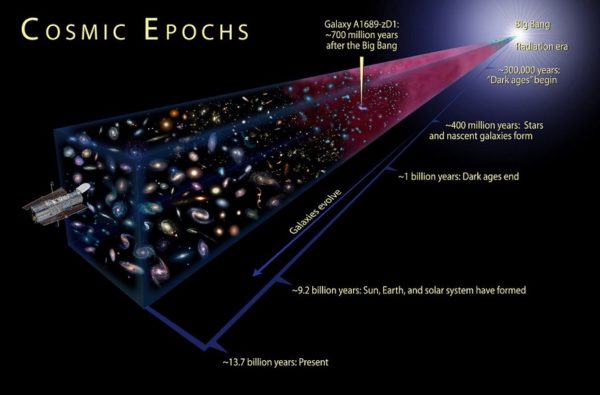"Old age is like a plane flying through a storm. Once you're aboard, there's nothing you can do." -Golda Meir
It’s been 13.8 billion years since the Big Bang for us, and when we look out at a distant object in the Universe, we’re seeing it as it was in the past. Its age — as it appears — is determined only by how long the light took for it to travel from that object to our eyes, but to someone living there, it will also appear that the Universe is 13.8 billion years old.
 Looking back a variety of distances corresponds to a variety of times since the Big Bang. Image credit: NASA, ESA, and A. Feild (STScI), via http://www.spacetelescope.org/images/heic0805c/.
Looking back a variety of distances corresponds to a variety of times since the Big Bang. Image credit: NASA, ESA, and A. Feild (STScI), via http://www.spacetelescope.org/images/heic0805c/.
But it is actually possible for an observer living on another planet, star or galaxy to perceive that significantly less time has passed since the Big Bang, so long as they were moving close to the speed of light relative to the CMB. Paradoxically, if they slowed their speed, they’d find that they themselves were still very young, but living in a 13.8 billion year-old Universe.


Space time continuum is subject too the constant law of absolute nothing paradox which is a impossibility. Think in reality as eternal and your human mind is blown away with impossible.
“What turns out to be true is that the Big Bang occurred everywhere in space 13.8 billion years ago…”
I can envision Ethan explaining this to a youngster:
“Uncle Ethan, where was the Big Bang?”
“Open your hand, Johnny.”
“OK. Now what?”
“That’s where it was!”
“Cool! ......But what about YOUR hand?”
Or maybe the scene would be more like this:
https://www.youtube.com/watch?v=JUOGxePBs50
Yess See, I can imagine it too. .
Teacher: "Class, where does rain come from?"
Noevo Jr: "Jesus!"
Mini Ethan: "Clouds!"
Teacher: "That's right, clouds. And where do clouds come from?"
Noevo Jr: "Jesus!"
Mini Ethan: "ocean water!"
Teacher: "That's right, the ocean water evaporating. And where do the oceans come from?"
Noevo Jr: "Jesus!"
Mini Ethan: "rivers!"
Teacher: "That's right, rivers running down to the sea. Its a big cycle..."
I'm not using hyperbole, either. This is an almost verbatim copy of a conversation my kid had with the teacher and another kid in preschool. I laughed at first. Then I felt great pity for the other kid, and some anger toward her parents. How could you do that to your kid?
I think I've mentioned the contributions of gaist at RI in this style.
I wish I could say that it strikes me as unusual for S.N. to ironically have internalized the form of ridicule, no matter how badly executed, for the sake of purest attention whoring.
We each have our own path to take and learn the lessons on the way. While most of us forge ahead, many are not aware of their next step, don't see it, are too scared to move forward, or just content to never advance. At some stage of our lives, we have been shown the tools and how to use them. It is still up to the individual to do what they will with them. No need to pity; just be thankful they will eventually learn.
To PJ #5:
I think I’d agree to that.
To eric:
In a recent blog here, you said
“Saying I won’t consider non-scientific hypotheses within science says nothing about how I view other disciplines…
some other ways are possible and useful…
I’ve never said anything not science sucks.”
I responded by saying
at bottom, science explores only the WHAT of the universe.
Any scientific explanations on the how, who, where, when, and even the WHY, are really just explanations of the WHAT, WHAT IS.
Science does not and can not answer the ultimate WHYs.
In a sense, whatever science comes up with, a reasonable thoughtful response could well be:
“So WHAT?”
So, in addressing the ultimate WHYs of life,
including the why/meaning of YOUR life,
what non-scientific disciplines in your view don’t “suck”?
You never responded there.
Maybe you will here.
https://s-media-cache-ak0.pinimg.com/736x/dd/07/d7/dd07d72b729faa3a380b…
If the Abrahamic god were truly just, willful stupidity would be physicially painful.
"WHAT" is the experience of touching a live 9–V battery to one's tongue is, by virtue of being purely subjective, not a scientific question.
"WHY" one would experience something described as "tingling" is.
"WHY" are you cluttering up these comments with irrelevant attention-whoring? Is it part of the "meaning of YOUR life"? If so, why?.
William Cantrell identifies several reasons why Einstein’s relativity theory has remained so popular:
First, the alternative theories have never been given much attention nor taught at any university. Second, the establishmentarians have invested a lifetime of learning in maintaining the status quo, and they will act to protect their investment. . . . Third, Einstein’s theory, being rather vaguely defined and self-contradictory by its own construction, allows some practitioners to display an aura of elitism and hubris in their ability to manipulate it. There is an exclusive quality to the theory – like a country club, and that is part of its allure. Fourth, to admit a fundamental mistake in such a hyped-up theory would be an embarrassment, not only to the physics community at large, but also to the memory of a man whose portrait hangs in nearly every physics department around the world.
There'd be a lot of explaining to do if Enstein was shown to be wrong.The more pointe question is of course,can he ever be allowed to be wrong ?
Philosophy, ethics, sociology, psychology, history, and probably a few others. These disciplines help us understand what sort of choices in life may make us happier or may lead us to achieving our personal goals. For a believer, theology would contribute too, but for non-believers, it doesn't. You, for instance, do not consider Hindu's cycle of reincarnation when deciding on the meaning of your life, because you're a non-believer in Hinduism.
As an aside, IMO English semantics doesn't really support any strict 'what vs. why' distinction like you're trying to draw. In this language the words are fairly interchangeable. We can just as easily switch your usage, and phrase the distinction as 'what should I do with my life' vs. 'why does the Earth rotate.'
"in addressing the ultimate WHYs of life,
including the why/meaning of YOUR life,
what non-scientific disciplines in your view don’t “suck”?"
What sucks is the insistence there must be an answer to "WHY" for life.
Why is YOUR answer better? Why is your answer an answer at all?
Why does there need to be an answer?
"I responded by saying
at bottom, science explores only the WHAT of the universe."
And what else would be answerable? Ever asked an ant WHY it lifted that bit of leaf and not another? Ever get an answer?
And as eric points out, "why do things fall down" is answered by science. Religion doesn't even get close.
WHAT answer has religion given to a "Why?" question? EVER.
"First, the alternative theories have never been given much attention nor taught at any university."
We also don't teach kids that pi=3. Because pi is not 3.
Nor do we teach them that authoritarian dictatorships are great political structures. Because we have no evidence that this is correct.
This point is therefore, ironically, pointless.
"Second, the establishmentarians have invested a lifetime of learning in maintaining the status quo,"
Moronic proclamation from an idiot who just has a hate-on for science.
"Third, Einstein’s theory, being rather vaguely defined and self-contradictory by its own construction"
Both claims invalid and false, therefore any conclusion based on their truth value is logically falsified.
"Fourth, to admit a fundamental mistake in such a hyped-up theory would be an embarrassment,"
A repeat of the second "point". Padding out your list is indication that you either have a short term memory problem or that you don't care what you say, or that you have a short term memory problem.
"Space time continuum is subject too the constant law of absolute nothing paradox which is a impossibility. "
Or the claim is ridiculous and malformed.
Mark Davies:
What alternative theories? Please be specific and provide observational evidence that indicates that these alternatives should be taken seriously. This must be evidence that is NOT explained by relativity but is explained by the alternative theory. The alternative theory must also correctly account for all of those observations (which is ALL observations to date) that are consistent with relativity.
Your second point may be reasonable, but it ignores the fact that there are new graduates from our universities every year joining the academic physics community. These are NOT scientists who have spent their lives dealing with relativity. In fact these scientists (as well as older ones) would have a great deal of motivation to try to overturn the existing paradigm. That's where lasting fame, Nobel prizes, etc. are earned after all. Confirming the existing paradigm may be important, but all of the "big name" scientists achieved that status by developing new theories, not just blindly confirming old ones.
Your third point is just completely and utterly nonsensical. Relativity is a quite well-defined and clear theory. The fact that you don't understand it well doesn't really change the fact that it is a completely clearly defined theory. You have to understand the math, especially when dealing with general relativity (the math in special relativity is actually quite simple; if you took high school algebra you have enough mathematical knowledge to understand special relativity). If you don't, analogies and verbal descriptions offered up as non-mathematical explanations of general relativity might seem ill defined, but the mathematics makes it quite precise. The predictions of GR are clear, and in all cases borne out by experiment. In short, GR is a perfectly valid scientific theory. That's not to say it could not be replaced someday if further evidence warrants, but it is the best theory we have right now.
Your final point is also nonsense. Einstein HAS been proven wrong, and it has been fellow physicists who have done so. He just wasn't wrong about relativity. He was completely and utterly wrong about quantum mechanics, though. He clung to the bitter end to the idea that the randomness in QM is not inherent to the theory but is rather the result of hidden variables that make experimental results seem random even though they are completely determinate. (This is the same idea that governs phenomena such as flipping a coin. The coin flip outcome is completely determinate, but seems random due to our lack of ability to establish the initial conditions of the flip).
Even regarding GR, Einstein got at least one thing "wrong". He assumed that the universe is static. He therefore added a "fudge factor" to his theory to make the solutions of his field equations yield a static solution when applied to the universe as a whole. Without this "mistake" he may well have predicted the expansion of the universe before Hubble made his observations of galactic redshifts.
Of course, we now regard the nonzero cosmological constant (as his fudge factor was called) as a reality that accounts for the accelerated expansion of the universe. It was a mistake at the time, nonetheless, because it was not based on evidence, but rather on a philosophical prejudice that the universe is static.